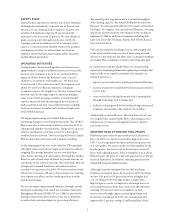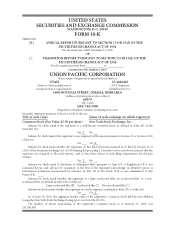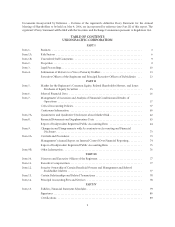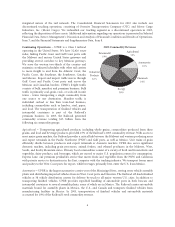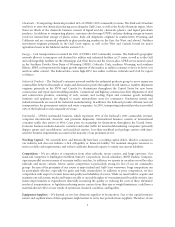Union Pacific 2005 Annual Report Download - page 14
Download and view the complete annual report
Please find page 14 of the 2005 Union Pacific annual report below. You can navigate through the pages in the report by either clicking on the pages listed below, or by using the keyword search tool below to find specific information within the annual report.have a material adverse effect on our operating results. Additionally, international, political, and economic
circumstances affect fuel prices and supplies. Weather can also affect fuel supplies and limit domestic refining
capacity. If a fuel supply shortage were to arise from OPEC production curtailments, a disruption of oil imports,
or other causes, higher fuel prices could, despite our fuel surcharge programs, have a material adverse effect on
our results of operations, financial condition, and liquidity.
The Majority of Our Employees Belong to Labor Unions, and Labor Agreements, Strikes, or Work Stoppages Could
Adversely Affect Our Operations – We are a party to collective bargaining agreements with various labor unions.
Under the collective bargaining round that began on November 1, 1999, all unions reached new labor agreements
with the railroads in 2005. In January 2005, we began the next round of negotiations with the unions. Disputes
with regard to the terms of these agreements or our potential inability to negotiate acceptable contracts with these
unions could result in, among other things, strikes, work stoppages, or other slowdowns by the affected workers.
If unionized workers were to engage in a strike, work stoppage, or other slowdown, or other employees were to
become unionized, we could experience a significant disruption of our operations or higher ongoing labor costs,
either of which could have a material adverse effect on our results of operations, financial condition, and liquidity.
Additionally, future national labor agreements, or renegotiation of labor agreements or provisions of labor
agreements, could compromise our service reliability and significantly increase our costs for healthcare, wages,
and other benefits, which could have a material adverse impact on our results of operations, financial condition,
and liquidity.
The Availability of Qualified Personnel Could Adversely Affect Our Operations – Changes in demographics, training
requirements, and the availability of qualified personnel, particularly engineers and trainmen, could negatively
impact our ability to meet demand for rail service. Unpredictable increases in demand for rail services and a lack
of network fluidity may exacerbate such risks, which could have a negative impact on our operational efficiency
and otherwise have a material adverse effect on our results of operations, financial condition, and liquidity.
We Face Competition from Other Railroads and Other Transportation Providers – We face competition from other
railroads, motor carriers and, to a lesser extent, ships, barges, and pipelines. In addition to price competition, we
face competition with respect to transit times and quality and reliability of service. While we must build or acquire
and maintain our rail system, trucks and barges are able to use public rights-of-way maintained by public entities.
Any future improvements or expenditures materially increasing the quality or reducing the cost of alternative
modes of transportation, or legislation releasing motor carriers from their size or weight limitations, could have a
material adverse effect on our results of operations, financial condition, and liquidity. Additionally, any future
consolidation of the rail industry could materially affect the competitive environment in which we operate.
We Utilize Capital Markets – We rely on the capital markets to provide some of our capital requirements,
including the issuance of commercial paper from time to time and the sale of certain of our receivables. Market
instability or deterioration of our financial condition due to internal or external factors could restrict or prohibit
our access to commercial paper and reduce our credit ratings below investment grade, which would prohibit us
from utilizing our sale of receivables program and significantly increase the cost of issuing debt.
We May Be Affected by General Economic Conditions – Prolonged negative changes in domestic and global
economic conditions affecting the producers and consumers of the commodities carried by us may have an
adverse effect on our results of operations, financial condition, and liquidity.
We Are Dependent on Two Key Domestic Suppliers of Locomotives – Due to the capital intensive nature and
sophistication of locomotive equipment, high barriers to entry face potential new suppliers. Therefore, if one of
these domestic suppliers discontinues manufacturing locomotives, we could experience a significant cost increase
and risk reduced availability of the locomotives that are necessary to our operations.
We Rely on Technology and Technology Improvements in our Business Operations – We rely on information
technology in all aspects of our business. If we do not have sufficient capital to acquire new technology or if we are
8


